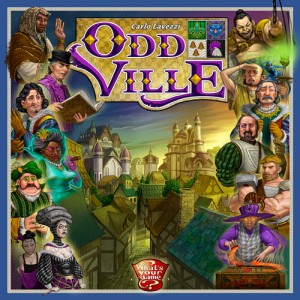On The Radar: Oddville
Posted by James (admin) on October 12th, 2012
 From reading the rules, Oddville looks like an interesting mix of using cards to gain resources and tile-laying to build a city. Now that may sound like a lot of other games but the game mechanics of Oddville look inventive and slick.
From reading the rules, Oddville looks like an interesting mix of using cards to gain resources and tile-laying to build a city. Now that may sound like a lot of other games but the game mechanics of Oddville look inventive and slick.
On your turn, you play 1 card from your hand or build 1 building. When a player plays a card, they can do 1 of the 3 things on the card – gain the cash shown, gain 1 of the resources shown, or gain 1 building from the 6 building cards on display (the card affects the price). I always like games where cards can be used for multiple purposes as it usually creates some interesting decision-making on how to combine the cards best and, hopefully, can be combined differently to give you alternate options if you need to change strategy.
When a player chooses to gain one of the resources on their played card, they place one of their workers on one of the market prices for that resource which are limited in number – this determines how much the resource costs plus the worker shows the player has that resource until they spend it to build a building. This should make for interesting competition over the lowest prices.
When a player chooses to gain a building, their card determines which of the 6 buildings on display are free and which will cost cash – the ones on the left (the oldest) are the ones most likely to be free. This sort of mechanic is in other games (like Gloria Mundi) and I like it because it makes newly added buildings (added to the right-end of the row) generally more expensive.
If a player chooses to build one of the buildings they have gained, they pay the resource cost (by removing workers from their place in the resources market). The player then places the building tile so it joins onto the growing city of tiles and any streets on it must match (similar to Carcassonne placement). The player gets the major and minor bonuses marked on the placed tile as well as any minor bonuses from any neighbouring tiles connected by streets to the new tile.
Major bonuses include cash and resources but also can allow the player to take the top-most character from the guild with the matching crest as their new building. Characters give their owners special abilities such as converting a cash card into a building card (which is done by flipping the cash card over as the buildings are on the other sides). If a player needs to gain a character and there are no more left of the required guild, all players must return all the characters of that guild to the pile. This seems like a nice extra element to the gameplay and efficient too.
As well as bonuses, the player places one of their workers on their newly built building tile too – they will earn VPs from the tiles they own at the end of the game. The VPs are scored in lots of different ways and the icons on them look very clear. Some give simple VPs, some for neghbouring tiles, tiles in the same row or column, tiles with specific guilds marked on them, etc. So, this should make players want to place/add buildings in specific locations, and add create some competition over those spaces.
The game ends when a player builds places their 6th worker in the city and VPs are scored for buildings, points on character cards and remaining resources.
Overall, Oddville seems to have an interesting mix of eurogame-style mechanics with some new ideas too and without being complex. There are many city building games and I’m hoping Oddville will be one of my favourites.
James.

